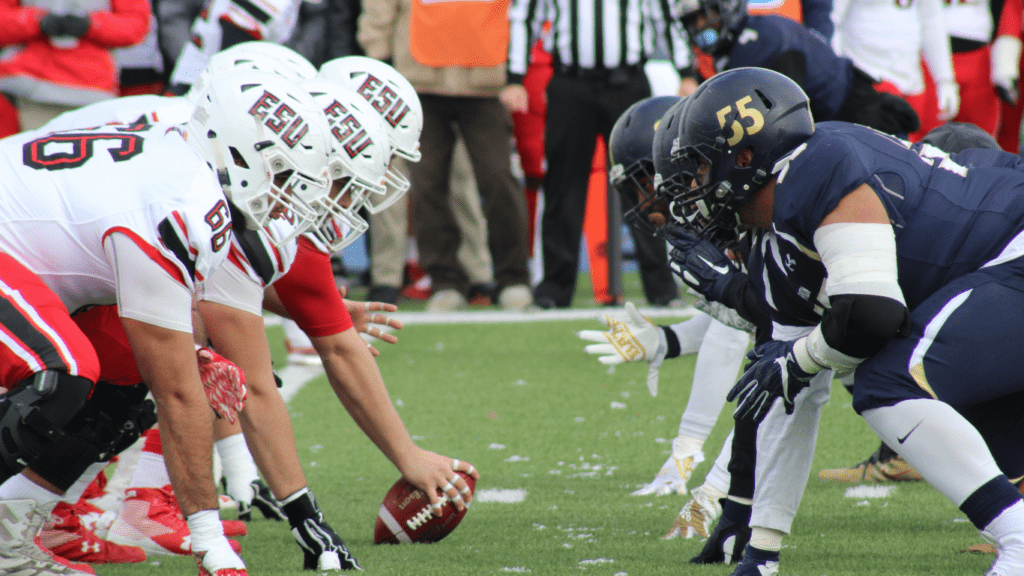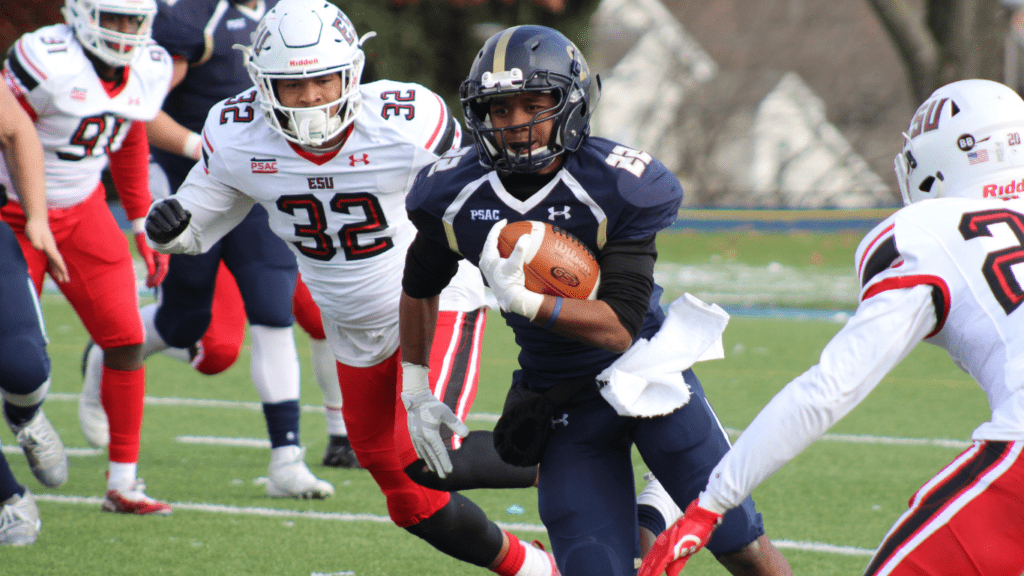Understanding College Football Betting
College football betting requires more than just passion for the sport. It’s vital to comprehend various bet types and how to analyze them to make informed decisions.
Types Of Bets
Knowing the different bet types helps in making smarter picks. Common types include:
- Moneyline Bets – Betting on which team will win the game. For instance, if Team A has a -150 Moneyline and Team B has +130, Team A is the favorite.
- Point Spread – Wagering on the margin of victory. A favorite needs to win by more than the given points, while an underdog can lose by fewer points than the spread or win outright.
- Totals (Over/Under) – Betting on the combined score of both teams. Bookmakers set a total, and you wager on whether the actual score will be over or under this number.
- Prop Bets – Betting on specific outcomes within a game, like the first team to score or the total number of touchdowns by a player.
Analyzing Team Performance
Understanding team dynamics is crucial. This includes reviewing:
- Recent Form – Look at the last five games to gauge consistency.
- Injuries – Check if key players are missing, which can affect performance.
- Head-to-Head Records – Consider previous matchups between the teams for pattern recognition.
Evaluating Player Statistics
Player performance is often a reflection of the team’s potential. Focus on:
- Quarterback Metrics – Yards per game and completion rates indicate offensive effectiveness.
- Defensive Stats – Metrics like sacks and interceptions signal defensive strength.
Considering External Factors
Sometimes, non-team factors play significant roles. Evaluate:
- Weather Conditions – Rain, snow, or strong winds can impact the game outcome.
- Home/Away Games – Teams often perform better at home due to familiar surroundings and crowd support.
Utilizing Betting Tools
Leveraging technology improves decision-making. Use:
- Betting Models – Software that predicts outcomes based on historical data.
- Public Betting Trends – Information on where the public is placing their bets, useful in understanding market sentiment.
Understanding these components helps in making smart betting picks in college football.
Researching Teams and Players

Thorough research on teams and players is essential for making smart picks in college football betting. Understanding detailed statistics and performance metrics provides a solid foundation for informed decisions.
Analyzing Team Statistics
Starting with team statistics is crucial. Key metrics include total offense and defense, points scored per game, and points allowed. Comparing these stats between competing teams reveals strengths and weaknesses. For example, if Team A averages 35 points per game and Team B allows 30 points, Team A has an offensive edge. Turnover margin is another important stat; a team with a positive margin often controls the game better. Also, third-down conversion rates can highlight a team’s efficiency in sustaining drives.
Evaluating Player Performance
Individual player performance significantly impacts game outcomes. Focus on key positions like quarterback, running back, and wide receiver. Quarterback rating, completion percentage, and touchdown-to-interception ratio for QBs provide valuable insights. For running backs, analyze yards per carry and total rushing yards. Wide receivers’ stats such as receptions, yards per catch, and touchdowns are critical. Consider injuries or recent performance trends, as they may indicate potential impacts on upcoming games. For example, a running back averaging 5 yards per carry can be a game-changer against a weak run defense.
Key Factors to Consider
When betting on college football, understanding various influential elements helps in making informed decisions. Below are critical factors to analyze.
Home-Field Advantage
Teams often perform better at home. Familiar surroundings, supportive crowds, and reduced travel stress contribute to higher success rates. Analyze a team’s home and away records, as well as how they perform in high-pressure games against strong opponents at home.
Weather Conditions
Weather affects game dynamics. Rain, snow, and wind can impact passing and kicking, leading to unexpected shifts in team performance. Check weather forecasts and historical performance data in similar conditions. Teams proficient in running games might thrive in adverse weather, giving them an edge.
Coaching Strategies
Coaching plays a pivotal role in game outcomes. Study a coach’s past performance, adaptability, and game plans. Successful coaches often excel in strategic adjustments and in-game decision-making. Look at historical data on how well head coaches perform in specific matchups and against certain play styles.
Each factor offers unique insights, enhancing the analysis required for smart college football betting picks.
Betting Strategies
College football betting becomes more effective with well-defined strategies. Understanding different bet types helps enhance your picks.
Moneyline Bets
Moneyline bets involve picking the outright winner of a game. These bets are straightforward but look beyond team performance alone. Research team form, head-to-head records, and player injuries to make informed decisions. For example, an underdog team with a strong recent performance might present valuable odds.
Point Spread Bets
Point Spread Bets require you to predict if a team will win or lose by a certain number of points. Bookmakers set a spread to even the playing field. Study team statistics, scoring patterns, and past performances against the spread. If a team consistently beats the spread, they’re likely a reliable pick. Conversely, a team that fails to cover the spread often should raise caution.
Over/Under Bets
Over/Under Bets focus on the total number of points scored in a game. You decide whether the total points will be over or under a set number. Evaluate team defensive and offensive capabilities, average points per game, and historical match scores. For instance, two high-scoring teams meeting might indicate an ‘over’ bet, while defensively strong teams suggest an ‘under’ bet.
Managing Your Bankroll
Effective bankroll management is crucial for sustained success in college football betting. Carefully managing your funds minimizes losses while maximizing potential gains.
Setting a Budget
Establish a fixed budget tailored to your financial situation. Allocate a specific amount for your betting activities and avoid exceeding this limit under any circumstances. For instance, if you assign $500 for the season, refrain from adding more money, even if you experience losses. This disciplined approach averts financial strain and keeps your betting activities enjoyable and sustainable.
Tracking Your Bets
Maintain meticulous records of your betting activities to analyze your performance. Use spreadsheets or specialized apps to log details such as bet type, amount wagered, odds, and outcomes. Continuously reviewing this data identifies successful strategies and areas needing improvement. For instance, noting patterns in Point Spread Bets could highlight your strengths or expose consistent misjudgments. Consistent tracking fosters insight and improves overall betting strategies.
Common Mistakes to Avoid
Making informed decisions means steering clear of common pitfalls. Let’s look at a couple of major mistakes that bettors often fall into and how to avoid them.
Betting with Bias
Betting based on personal preferences is a common error. I’ve seen people favor their alma mater or hometown team without proper analysis. Always focus on data and statistics rather than feelings. For example, backing a favorite team can lead to overlooking their weaknesses. Analyze team performance, injuries, and other relevant factors objectively.
Chasing Losses
Trying to recover from losses through impulsive bets is another frequent mistake. When bettors chase losses, they often make irrational decisions. I recommend setting strict loss limits and sticking to them. For example, if you lose $100, resist the temptation to place aggressive bets to recoup it. Maintain your strategy and stay disciplined to avoid further financial setbacks.




